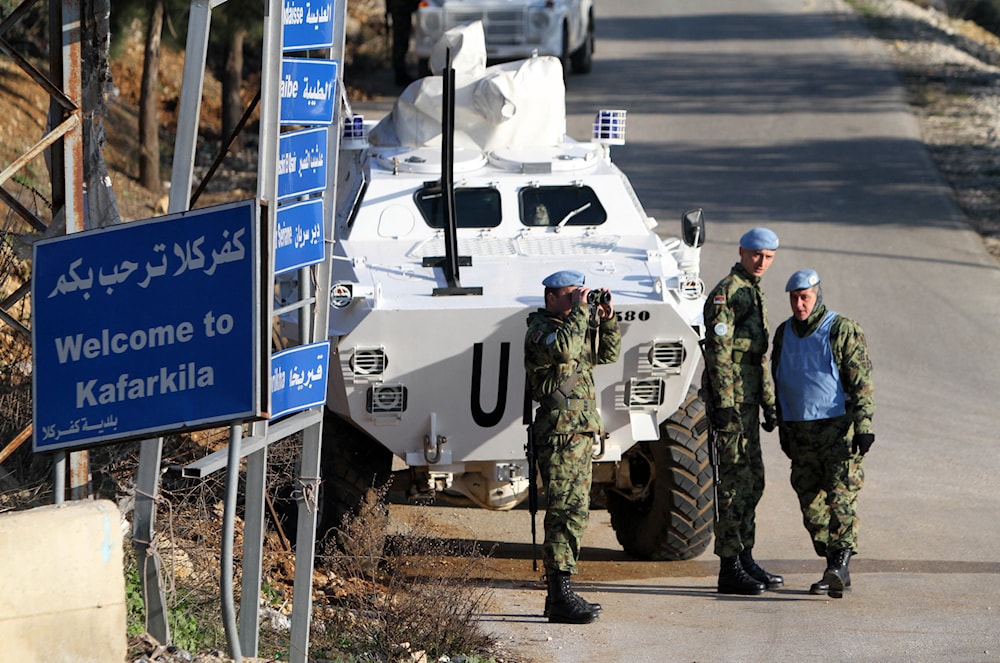Bahrain urges UNSC to pass ceasefire resolution for southern Lebanon
Manama calls for "a cease-fire between the two sides and resorting to peaceful solutions through negotiation to preserve the lives of the civilian population."
-

A Serbian UN peacekeeper looks through binoculars to monitor the border with occupied Palestine while standing next to an armored vehicle, during a patrol of the Lebanese-Palestinian border, in the southern village of Kfar Kila, Lebanon, on January 19, 2015. (AP)
Bahrain's official news agency reported that Manama called on the UN Security Council on Saturday to issue a resolution for a ceasefire in southern Lebanon, stating it had been monitoring the developments and military escalation on the Lebanese-Palestinian border, and expressing its concern about the escalation.
Bahrain's Foreign Ministry emphasized "the necessity of avoiding military escalation and preventing the widening of the conflict in the region to preserve Lebanon's security, while seeking to achieve security, peace, and stability in the region."
Manama also called for "a ceasefire between the two sides and resorting to peaceful solutions through negotiation to preserve the lives of the civilian population and ensure the security and stability of the region."
Kingdom of Bahrain calls for avoiding military escalation on Lebanese-Israeli border https://t.co/oRe7IuUEdV pic.twitter.com/zi3E1TwZw9
— وزارة الخارجية 🇧🇭 (@bahdiplomatic) June 29, 2024
The kingdom called on the UN Security Council to urgently intervene and pay attention to the confrontations on the border of southern Lebanon, also calling for the issuance of "an immediate cease-fire resolution to prevent the conflict from escalating." It also warned of "serious repercussions on regional and international security and stability if the conflict expands."
This comes amid the ongoing confrontations between the Islamic Resistance in Lebanon and "Israel" since the start of the war on the Gaza Strip.
Read next: What does the US ceasefire proposal backed by the UNSC entail?
12 countries issue warnings to citizens amid Lebanon-'Israel' tensions
On a similar note, amid escalations, seven countries have urged their citizens to evacuate from Lebanon, while five others warned their citizens not to travel to Lebanon at this time. Saudi citizens currently in Lebanon were asked by the Saudi Embassy in Beirut on Saturday "to depart the Lebanese territory immediately" and were reminded to "stay in touch with the embassy in case of any emergencies."
Australia "strongly advised" its citizens against traveling to the region, while the Dutch Foreign Ministry instructed its people not to travel to Lebanon and to evacuate using available commercial airlines. Germany's Foreign Ministry emphasized that "the situation at the border between Israel and Lebanon is very tense." The Canadian government urged its citizens in Lebanon to return home, and North Macedonia also requested its nationals to evacuate promptly. The US Embassy in Beirut cautioned American nationals against visiting regions near the Lebanese-Palestinian border. The UK's Foreign, Commonwealth, and Development Office advised its citizens against all travel to Lebanon. On the other hand, the Russian Ambassador to Lebanon Alexander Rudakov encouraged Russians to wait out the situation and reassured them that "there are no reasons for serious panic." Jordan urged its nationals to avoid traveling to Lebanon, and the Irish Foreign Ministry advised its nationals in Lebanon to exercise caution.
This is yet another wave of warnings by embassies located in Lebanon amid an escalation of tensions between "Israel" and the Lebanese Resistance along the border with Palestine.
Tensions have heightened between Lebanon and "Israel" in recent weeks, with the Israelis escalating their attacks further into Lebanese territory and threatening to send the country "back to the Stone Age." As a result, media around the globe is speculating over the possibility of a full-scale war.

 3 Min Read
3 Min Read








